- Home
- »
- Biotechnology
- »
-
mRNA Therapeutics Market Size And Share Report, 2030GVR Report cover
![mRNA Therapeutics Market Size, Share & Trends Report]()
mRNA Therapeutics Market (2024 - 2030) Size, Share & Trends Analysis Report By Application (Rare Genetic Diseases, Oncology, Respiratory Diseases, Infectious Diseases), By Type (Prophylactic, Therapeutic), By End-use, By Region, And Segment Forecasts
- Report ID: GVR-4-68039-957-3
- Number of Report Pages: 120
- Format: PDF
- Historical Range: 2018 - 2023
- Forecast Period: 2024 - 2030
- Industry: Healthcare
- Report Summary
- Table of Contents
- Segmentation
- Methodology
- Download FREE Sample
-
Download Sample Report
mRNA Therapeutics Market Summary
The global mRNA therapeutics market size was estimated at USD 11.75 billion in 2023 and is projected to reach USD 31.30 billion by 2030, growing at a CAGR of 17.05% from 2024 to 2030. mRNA-based therapeutics have generated significant attention in recent years owing to their strong potential in treating chronic diseases. mRNA vaccines provide several benefits over DNA vaccines in terms of production, distribution, and safety.
Key Market Trends & Insights
- The North America mRNA therapeutics market accounted for the largest revenue share of 40.37% share in 2023.
- The mRNA therapeutics market in the U.S. is expected to grow over the forecast period.
- Based on applications, the market is further segmented into rare genetic diseases, oncology, respiratory diseases, infectious diseases, and others.
- Based on types, the market is further categorized into prophylactic and therapeutic.
- Based on end-uses, the market is further segmented into hospitals & clinics, research organizations, and others.
Market Size & Forecast
- 2023 Market Size: USD 11.75 Billion
- 2030 Projected Market Size: USD 31.30 Billion
- CAGR (2024-2030): 17.05%
- North America: Largest market in 2023
- Asia Pacific: Fastest growing market
They have shown promise in human clinical studies, increasing the demand for messenger ribonucleic acid-based vaccines and therapeutics. A rise in the number of clinical trials and growing use of stem cell therapies worldwide are driving the market’s expansion. Government agencies from several nations, research institutions, and numerous biotech & pharmaceutical companies are focusing on efficient & quick methods for detecting COVID-19. In addition, mRNA vaccines are a safe and efficient method for preventing COVID-19. The advantages associated with the COVID-19 messenger RNA vaccines have sparked the attention of pharmaceutical businesses in delivering RNA vaccines swiftly across the globe. As a result, the usage of RNA vaccines is projected to increase during the pandemic. In addition, the mRNA-1273 and BNT162b2 began phase III clinical studies in late July 2020 after positive results in phase I & phase II clinical trials.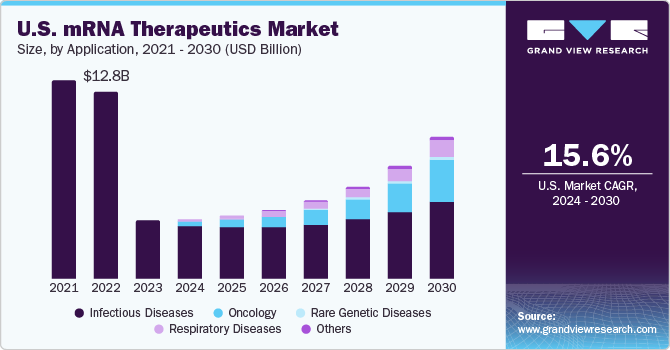
It also shows around 94.1% efficacy in symptomatic prevention from COVID-19 and received urgent authorization from the U.S. FDA for widespread immunization of people. Biopharmaceuticals, such as monoclonal antibodies, peptides, and nucleic acids, have attracted significant attention as ground-breaking therapeutic approaches aim to meet the high expectations of treating significant medical illnesses. Moreover, messenger RNA-based technologies have proven to be incredibly promising in treating and preventing several diseases. In addition, technological advancements and scientific study over the past 10 years have made messenger RNA a feasible therapeutic option, eliminating some of the problems with its use, such as its brief half-life and innate immunogenicity.
Hence, the adoption of mRNA therapeutic medicines is expected to increase. Moreover, due to the temporary nature of messenger RNA translation and lack of integration of the foreign material into the cell’s genome, the resulting cellular therapeutic product has numerous benefits over the one obtained by a more conventional approach: easier production under acceptable manufacturing procedures, reduced cytotoxicity from on-target off-tumor effects, and better clinical validation & regulatory treatment. Hence, it is expected to increase the demand for mRNA therapeutics, boosting the market growth.
Market Concentration & Characteristics
The industry growth stage is high, and the pace of its growth is accelerating. The market is characterized by a high degree of innovation owing to rapid technological advancements. Beyond COVID-19 messenger RNA vaccines, the industry is diversifying into oncology and rare diseases. Technology trends focus on refining lipid nanoparticle delivery, personalized messenger ribonucleic acid sequences, and self-amplifying platforms
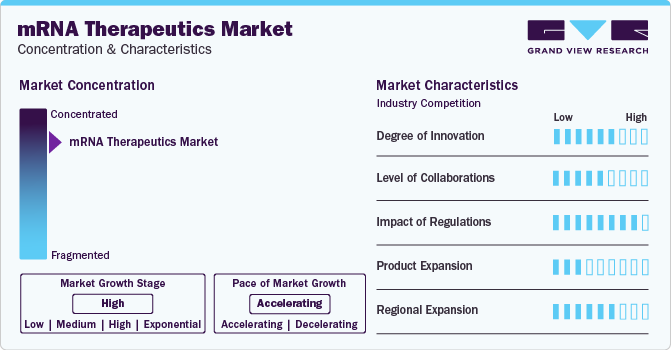
The industry is also characterized by a high level of partnerships and collaboration activity undertaken by the leading players. This is attributed to the rising focus on increasing the company’s products & services portfolio, the need to consolidate in a rapidly growing market, and enhancing the reach of their products. Several companies are undertaking this strategy to strengthen their portfolio. For instance, in September 2023, BioNTech SE partnered with the Coalition for Epidemic Preparedness Innovations (CEPI) to advance the mRNA-based Mpox vaccine development
The industry is witnessing regulatory trends that foster innovations. Regulatory bodies like the FDA, are adopting flexible approaches for expedited approvals. Notably, the rapid authorization of Pfizer-BioNTech’s COVID-19 vaccine showcased regulatory adaptability, setting a precedent for an efficient approval process in the evolving landscape of mRNA-based therapies
Several companies are expanding their messenger RNA-based therapeutic products. Thus, product expansion in this industry is significant. Companies are including product launches that are specifically used in messenger RNA therapeutics. This is anticipated to drive market growth. For instance, in November 2023, Moderna, Inc., in collaboration with Australian organizations, introduced an mRNA platform to advance messenger RNA medicine
Factors, such as increased R&D activities, rising demand for mRNA vaccines, advancements in technology, and growing awareness & acceptance of mRNA therapeutics, have led to the development of new therapies and vaccines, leading to the establishment of manufacturing facilities and distribution networks in different regions. For instance, in November 2023, Sanofi inaugurated a new mRNA research site at Griffith University. This initiative was expected to boost mRNA R&D activities to develop novel therapeutics
Application Insights
Based on applications, the market is further segmented into rare genetic diseases, oncology, respiratory diseases, infectious diseases, and others. The infectious disease segment held the largest market share of 100% in 2023, primarily owing to the demand for COVID-19 therapeutics. In addition, the increasing adoption of messenger RNA-based vaccines and a growing number of candidates entering clinical trials for various infectious diseases are anticipated to drive the market growth over the forecast period. For instance, in August 2021, Pfizer-BioNTech COVID-19 mRNA vaccine received EUA for prevention of COVID-19 disease in individuals aged 16 years and older.
In addition, in September 2023, BioNTech and Pfizer received the U.S. FDA approval for mRNA-based COVID-19 vaccine COMIRNATY 2023-2024 formulation for individuals aged 12 years and older. Thus, increasing FDA approval of novel mRNA therapeutics is expected to drive the segment. The oncology segment is expected to register the highest CAGR over the forecast period. mRNA technology has shown promising results in cancer research, and there have been ongoing clinical trials exploring the use of RNA vaccines and therapies for various types of cancer. For instance, personalized mRNA cancer vaccines can help stimulate the immune system to target and attack cancer cells.
Type Insights
Based on types, the market is further categorized into prophylactic and therapeutic. The prophylactic segment completely dominated the market with a share of 100% in 2023. COVID-19 products currently account for most prophylactic vaccine revenues. Vaccines for other illnesses, including influenza and respiratory syncytial virus, are expected to contribute to segment growth over the coming years. The clinical trials and development of RNA vaccines for COVID-19, influenza, HIV, and other viral infections are now being undertaken by several key players to strengthen their market positions as well as generate lucrative revenue.
For instance, in February 2023, RVAC Medicines began the phase IB clinical trial for three COVID-19 mRNA vaccine candidates in Singapore after receiving approval from the Health Sciences Authority (HSA). The therapeutics segment is expected to register the highest CAGR from 2024 to 2030. Growing expenditure by key market players to produce novel and effective RNA therapeutics is expected to boost market growth over the forecast years. For instance, in July 2022, Axcelead, Inc.’s subsidiary companies Axcelead Drug Discovery Partners, Inc. and ARCALIS, Inc. came together to offer comprehensive drug discovery support services for messenger RNA-based vaccines and therapeutics.
End-use Insights
Based on end-uses, the market is further segmented into hospitals & clinics, research organizations, and others. The hospitals & clinics segment dominated the market with a share of 45.36% in 2023 and is expected to register the fastest growth rate from 2024 to 2030. The widespread use of messenger RNA-based vaccines and therapeutics to treat chronic diseases is expected to boost the market for personalized pharmaceuticals. The segment growth is also likely to be driven by the increasing number of patients visiting hospitals and clinics.
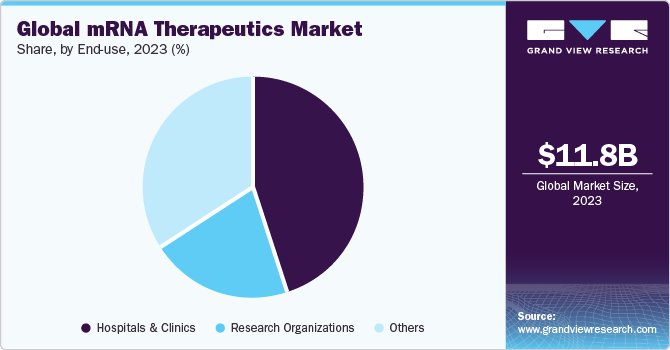
The other segment is expected to register a significant CAGR from 2024 to 2030. The other segment includes specialty pharmacies, which play a vital role in distributing and administering messenger RNA vaccines, primarily due to the unique storage requirements associated with these vaccines. For instance, the Pfizer-BioNTech mRNA COVID-19 vaccine, which initially required ultra-low-temperature storage, benefits significantly from the expertise of specialty pharmacies in handling temperature-sensitive medications.
Regional Insights
The North America mRNA therapeutics market accounted for the largest revenue share of 40.37% share in 2023. The availability of significant research funding, the rise in federal programs adopting RNA-based medicines, and increasing number of clinical trials are expected to drive the region’s growth. For instance, in November 2020, The National Institutes of Health (NIH), the Defense Department, and federally funded academic laboratories supported Graham and others’ basic research, which has been a crucial component in the rapid development of vaccinations against COVID-19.
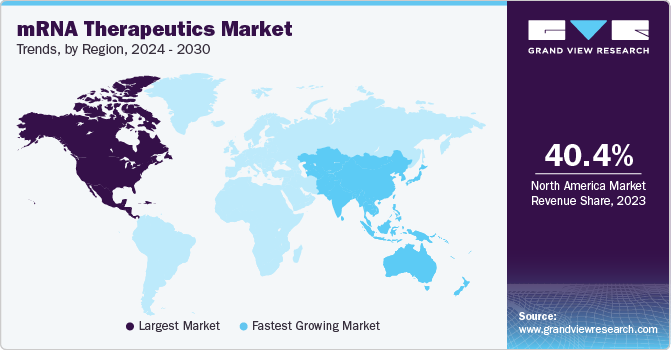
U.S. mRNA Therapeutics Market Trends
The mRNA therapeutics market in the U.S. is expected to grow over the forecast period due to the presence of key market players in the U.S. that are undergoing various strategic initiatives, such as collaborations and partnerships.
Europe mRNA Therapeutics Market Trends
The Europe mRNA therapeutics market is identified as a lucrative region in this industry. This is attributed to strong government support, advancements in research infrastructure, and the success of COVID-19 vaccines based on messenger RNA.
The mRNA therapeutics market in the UK is expected to grow over the forecast period due to growing government deals with companies signed within the country to manage the pandemic, such as COVID-19.
The France mRNA therapeutics market is expected to grow over the forecast period owing to increasing investments by major players in the development of messenger RNA-based vaccines.
The mRNA therapeutics market in Germany is expected to grow over the forecast period due to the presence of a substantial number of providers offering messenger RNA therapeutics and initiatives undertaken to expand the scope of these tools.
Asia Pacific mRNA Therapeutics Market Trends
The Asia Pacific mRNA therapeutics market is anticipated to witness the fastest growth from 2024 to 2030. This growth is attributed to increasing investment in biotechnology, advancements in healthcare infrastructure, and a growing focus on precision medicine. Future trends involve increasing applications beyond infectious diseases to oncology and genetic disorders, with notable examples being China’s investment in messenger RNA research and Japan’s efforts in personalized medicine.
The mRNA therapeutics market in China is expected to grow over the forecast period due to several initiatives undertaken by local companies to advance the messenger ribonucleic acid synthesis landscape.
The Japan mRNA therapeutics market is expected to grow over the forecast period. Major players in the market are adopting several strategies, including mergers & acquisitions, partnerships & collaborations, to stay competitive in the region.
Middle East and Africa mRNA Therapeutics Market Trends
The mRNA therapeutics market in Middle East & Africa (MEA) is witnessing growth propelled by increasing healthcare investments and a rising focus on advanced medical solutions. Drivers include government initiatives, such as the UAE’s commitment to advancing biotechnology and fostering collaborations with mRNA technology developers.
The Saudi Arabia mRNA therapeutics market is expected to grow over the forecast period. Due to the rapidly expanding biologics industry, many globally established players are entering the market and partnering with local players in this country.
The mRNA therapeutics market in Kuwait is expected to grow over the forecast period due to the presence of several multinational and regional pharmaceutical companies in the country.
Key mRNA Therapeutics Company Insights
The market players operating in the mRNA therapeutics market are adopting product approval strategies to increase the reach of their products and improve their availability in diverse geographical areas, along with expansion as a strategy to enhance production/research activities. In addition, several market players are acquiring smaller players to strengthen their market position. This strategy enables companies to increase their capabilities, expand their product portfolios, and improve their competencies.
Key mRNA Therapeutics Companies:
The following are the leading companies in the mRNA therapeutics market. These companies collectively hold the largest market share and dictate industry trends.
- Moderna Inc.
- BioNTech SE
- CureVac N.V.
- Arcturus Therapeutics
- Sanofi
- GSK Plc.
- Argos Therapeutics Inc.
- Ethris
- Pfizer Inc.
- AstraZeneca
Recent Developments
-
In September 2023, Moderna, Inc. expanded its messenger ribonucleic acid research across oncology, respiratory, and rare diseases. This initiative was anticipated to fuel the company’s revenue
-
In August 2023, CureVac announced the commencement of dosing for the initial participant in a Phase 2 study. This study focuses on modified COVID-19 mRNA vaccine candidates developed through a collaboration with GSK Plc
-
In January 2023, BioNTech SE entered a strategic collaboration with the UK government to supply personalized messenger RNA cancer immunotherapies for up to 10,000 patients by 2030. This initiative positively impacted the company’s revenue
-
In January 2023, BioNTech SE completed the acquisition of InstaDeep Ltd. This initiative was anticipated to strengthen BioNTech’s AI-powdered drug discovery, design, and development
mRNA Therapeutics Market Report Scope
Report Attribute
Details
Market size value in 2024
USD 12.17 billion
Revenue forecast in 2030
USD 31.30 billion
Growth rate
CAGR of 17.05% from 2024 to 2030
Actual data
2018 - 2023
Forecast period
2024 - 2030
Quantitative units
Revenue in USD million/billion and CAGR from 2024 to 2030
Report coverage
Revenue forecast, company ranking, competitive landscape, growth factors, and trends
Segments covered
Application, type, end-use, region
Regional scope
North America; Europe; Asia Pacific; Latin America; MEA
Country scope
U.S.; Canada; Germany; UK; France; Italy; Spain; Denmark; Sweden; Norway; China; Japan; India; South Korea; Australia; Thailand; Brazil; Mexico, Argentina; South Africa; Saudi Arabia, UAE; Kuwait
Key companies profiled
Moderna Inc.; BioNTech SE; CureVac N.V.; Arcturus Therapeutics; Sanofi; GSK Plc.; Argos Therapeutics Inc.; Ethris; Pfizer Inc.; AstraZeneca
Customization scope
Free report customization (equivalent up to 8 analysts working days) with purchase. Addition or alteration to country, regional & segment scope
Pricing and purchase options
Avail customized purchase options to meet your exact research needs. Explore purchase options
Global mRNA Therapeutics Market Report Segmentation
This report forecasts revenue growth at global, regional, and country levels and provides an analysis of the latest trends in each of the sub-segments from 2018 to 2030. For this study, Grand View Research has segmented the mRNA therapeutics market report based on application, type, end-use, and region:
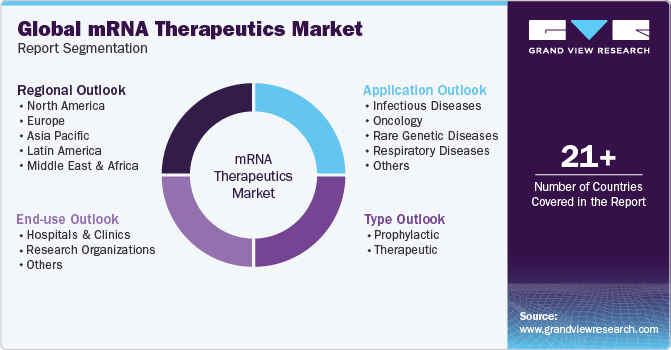
-
Application Outlook (Revenue, USD Million, 2018 - 2030)
-
Infectious Diseases
-
Oncology
-
Rare Genetic Diseases
-
Respiratory Diseases
-
Others
-
-
Type Outlook (Revenue, USD Million, 2018 - 2030)
-
Prophylactic
-
Therapeutic
-
-
End-use Outlook (Revenue, USD Million, 2018 - 2030)
-
Hospitals & Clinics
-
Research Organizations
-
Others
-
-
Regional Outlook (Revenue, USD Million, 2018 - 2030)
-
North America
-
U.S.
-
Canada
-
-
Europe
-
Germany
-
UK
-
France
-
Italy
-
Spain
-
Denmark
-
Sweden
-
Norway
-
-
Asia Pacific
-
China
-
Japan
-
India
-
South Korea
-
Australia
-
Thailand
-
-
Latin America
-
Brazil
-
Mexico
-
Argentina
-
-
Middle East & Africa
-
South Africa
-
Saudi Arabia
-
UAE
-
Kuwait
-
-
Frequently Asked Questions About This Report
b. The global mRNA therapeutics market size was estimated at USD 11.75 billion in 2023 and is expected to reach USD 12.17 billion in 2024.
b. The global mRNA therapeutics market is expected to witness a compound annual growth rate of 17.05% from 2024 to 2030 to reach USD 31.30 billion in 2030.
b. Prophylactic Vaccines captured the 100% market share in 2023
b. Moderna, Inc., Sanofi, Pfizer Inc., AstraZeneca, and BioNTech SE are a few of the key players in the industry.
b. The rising prevalence of cancer, growing demand for therapeutics medicines, growing knowledge of various advantages of mRNA vaccines, and rising academic & industrial interest in mRNA-based products are anticipated to boost the market growth over the forecast period.
Share this report with your colleague or friend.
Need a Tailored Report?
Customize this report to your needs — add regions, segments, or data points, with 20% free customization.

ISO 9001:2015 & 27001:2022 Certified
We are GDPR and CCPA compliant! Your transaction & personal information is safe and secure. For more details, please read our privacy policy.
Trusted market insights - try a free sample
See how our reports are structured and why industry leaders rely on Grand View Research. Get a free sample or ask us to tailor this report to your needs.










